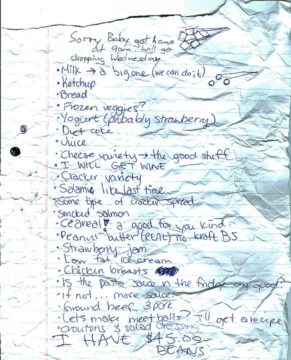by Mark Harvey
 Vitamins and self-help are part of the same optimistic American psychology that makes some of us believe we can actually learn the guitar in a month and de-clutter homes that resemble 19th-century general stores. I’m not sure I’ve ever helped my poor old self with any of the books and recordings out there promising to turn me into a joyful multi-billionaire and miraculously develop the sex appeal to land a Margot Robbie. But I have read an embarrassing number of books in that category with embarrassingly little to show for it. And I’ve definitely wasted plenty of money on vitamins and supplements that promise the same thing: revolutionary improvement in health, outlook, and clarity of thought.
Vitamins and self-help are part of the same optimistic American psychology that makes some of us believe we can actually learn the guitar in a month and de-clutter homes that resemble 19th-century general stores. I’m not sure I’ve ever helped my poor old self with any of the books and recordings out there promising to turn me into a joyful multi-billionaire and miraculously develop the sex appeal to land a Margot Robbie. But I have read an embarrassing number of books in that category with embarrassingly little to show for it. And I’ve definitely wasted plenty of money on vitamins and supplements that promise the same thing: revolutionary improvement in health, outlook, and clarity of thought.
On the face of it, there’s nothing wrong with self-help. I think one of the most glorious and heartening visions in the world is that of an extremely overweight man or woman jogging down the side of the road in athletic clothing and running shoes. When I see such a person, I say a little atheist prayer hoping that a year from now they have succeeded with their fitness regime and are gliding down the Boston Marathon, fifty pounds lighter. You never know how they decided to buy a pair of running shoes and begin what has to be an uncomfortable start toward fitness. But if it was a popular book or inspirational YouTube video that nudged them in that direction, then glory be!
The same goes with alcoholics and drug addicts. Chances are, millions are bucked up by a bit of self-help advice from a recovering addict or alcoholic, an inspirational quote they read, and even certain supplements to help their bodies heal from abuse.
But so much of what’s sold as life-changing does little more than eat at a person’s finances in little $25 increments of shiny books and shiny bottles. Sometimes the robberies are bigger—thousands of dollars in the form of fancy seminars, retreats, or involved online classes. There are thousands of versions of snake oil, and there will always be people lining up for some version of it. Read more »


 1859 was not a bad year for publishing in Britain. Books that came out that year included Darwin’s On the Origin of Species, John Stuart Mill’s On Liberty, and George Eliot’s Adam Bede. The first installments of Dickens’ A Tale of Two Cities and Wilkie Collins’ The Woman in White also made their appearance. And Samuel Smiles published Self-Help.
1859 was not a bad year for publishing in Britain. Books that came out that year included Darwin’s On the Origin of Species, John Stuart Mill’s On Liberty, and George Eliot’s Adam Bede. The first installments of Dickens’ A Tale of Two Cities and Wilkie Collins’ The Woman in White also made their appearance. And Samuel Smiles published Self-Help.